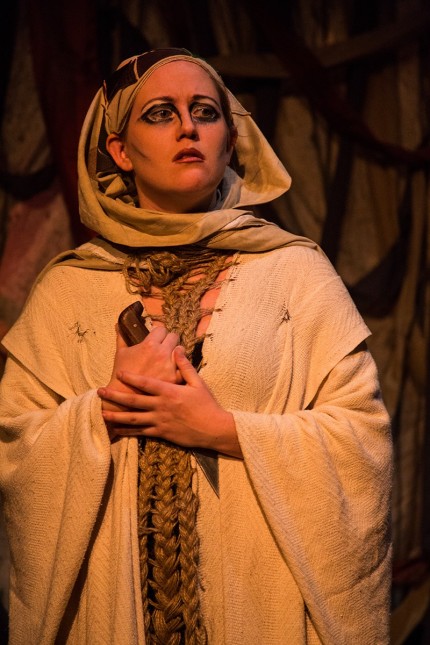Third Eye Theatre provides a strong local premiere for Fairouz opera

One year ago Third Eye Theatre Ensemble made its debut with a riveting production of Gian Carlo Menotti’s The Medium.
Chicago’s upstart storefront opera company is back with its sophomore effort, Sumeida’s Song by Mohammed Fairouz, presented in its Chicago premiere and currently running at the Prop Theater on the northwest side.
Fairouz has been composing since age 7, and the 30-year-old American has already created a significant body of work, which includes four symphonies, concertos for violin, clarinet and cello, two string quartets, a wind quintet, and this opera, with a second in the works.
Written in 2008 when Fairouz was just 22, Sumeida’s Song is a grim tale of ancient hatreds and family revenge. Like many Fairouz works, it draws its milieu and some of its musical inspiration from his Arabic lineage.
Asakir, an Egyptian peasant of the Azzizi clan, waits for her son Alwan to return after years away from their village. She hopes Alwan will avenge the murder of his father 17 years earlier from a member of the Tahawi family, their historic enemies. Asakir has saved the knife used to kill and decapitate her husband, which she gives to her son, telling him he must kill Suweilam Tahawi, who she believes guilty of the murder.
Alwan is horrified at his embittered mother’s vengeful hatred and tells her he has returned to the village to help improve the living conditions for all, not to kill anyone. Asakir renounces Alwan, raging angrily that he is a coward, disowning him and sending him away. When Alwan’s cousin Sumeida asks where Alwan has gone, Asakir tells him what has happened and demands that Sumeida murder her dishonored son. When he protests, she taunts him and says he too will be disgraced if he doesn’t perform the deed; Sumeida defensively grabs the knife and runs out to catch Alwan before he boards the train. Coming from afar, Sumeida’s song confirms Alwan’s death and a penitent Asakir laments the fate of her son.
Sumeida’s Song is not exactly a light-hearted frolic and, as often with the Arab-American composer, the surface scenario seems to touch on broader issues of destructive religious hatred, revenge killing and murders of innocents, sadly familiar from contemporary headlines.
Fairouz’s one-act opera is an impressive achievement for a composer of college age. Fairouz’s style is a fluent, intriguing melding of varied aspects of the Western classical tradition with elements of Middle Eastern music. There are lyrical moments and microtonal astringency allied to multihued colors that suggest the middle Eastern bazaar and dance. Yet for all its variegated influences, the hour-long score flows naturally and compellingly. Even in the reduced instrumentation for piano and violin at these performances, Fairouz’s originality and distinctive voice comes through, a testament to the composer as much as the instrumental skill of pianist-conductor Jason Carlson.
Fairouz’s libretto is less successful, transcribed by the composer from Tawfiq al-Hakim’s play, Song of Death. It has its talky moments and the high-decibel confrontations become a bit sonically overwhelming in the tiny black box space. Still, Sumeida’s Song is an ambitious and impressive first attempt at an opera by a greatly gifted young composer, and Third Eye Theatre Ensemble deserves praise for spotlighting Fairouz, a composer whose music is woefully neglected on the local scene.
The company is fielding double casts for this show and Friday night’s singers delivered a committed and intense performance.
Erin Moll brought fearless intensity to the bitter, unhinged Asakir, a kind of Mommy Dearest of the desert. The young mezzo-soprano threw herself into the demanding role singing with volatile commitment.
Noah Gartner displayed a warm baritone and calm presence as Alwan. Mary Lutz Govertsen was forceful as Asakir’s sister Mabrouka, with William Dwyer making belated impact as her weak son Sumeida.
Conducting from the piano with violinist Maya Shiraishi in support, Carlson directed a fluent, well-paced performance with polished and expressive playing that made one forget the slender forces.
The makeup to make the two women appear much older was less than stellar but otherwise the staging made much out of little. Jimmy Jagos’s multicolored strands of fabric and floor pillows painted the Middle-Eastern setting subtly and effectively. Eric Vigo’s lighting was evocative and nicely heightened the action at dramatic peaks. Director Rose Freeman moved the action efficiently in the small space, avoiding dead spots in the action.
__________
The performance of Fairouz’s opera was preceded by a varied selection of the composer’s music Friday night
Soprano Angela Born delivered an impassioned performance of the extended song, Refugee Blues. Kathryn Satoh offered three capably played selections from Native Informant for solo violin, which shows Fairouz’s artful melding of Bachian counterpoint with muezzin-like febrile lines.
Carlson brought spare eloquence to the Piano Miniature No. 11 “For Syria.” And baritone Christopher Skyles offered a solid rendering of the song, After The Revels.
Sumeida’s Song runs through November 8 at the Prop Theater, 3502 N. Elston. thirdeyete.com.
Posted in Uncategorized




